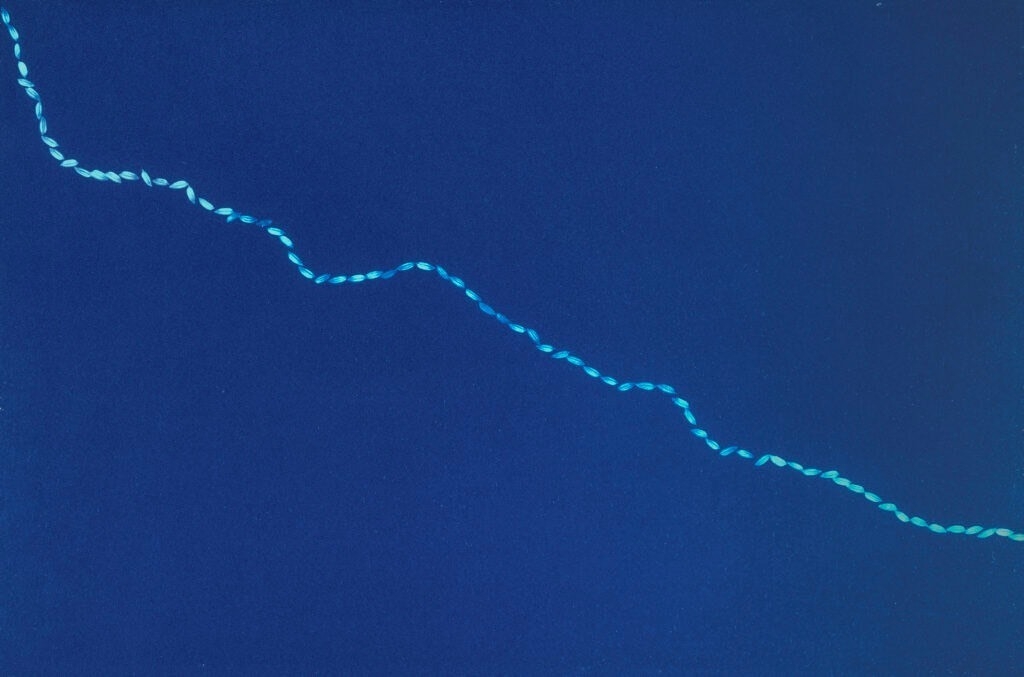Seeds Shall Set Us Free is the title of a solo exhibition centered around the work of Munem Wasif, an artist based in Dhaka, Bangladesh, whose practice turned from documentary photography and filmmaking to artistic investigations community-controlled and biodiversity-based food systems in recent years. This presentation at Fotogalleriet by the artist, the first in the Nordic countries, will depart from Seeds Shall Take Us Free (2017-2021), consisting of a series of documents, photographs, and cyanotypes that refer to classic scientific representation and “alpona,” the Bengali practice of creating ritual floor paintings using rice paste.

Rice grains, plant cultivation, and an “ecosophical” mode of agriculture are the points of departure for supporting knowledge about species biodiversity and excavating into the history of ecological colonialism in Bangladesh and the destruction of agricultural ecologies with the introduction of monoculture plantation farming, which not only threatened to destroy local multi-species but led to famine. By working in close collaboration with local community, farmers and the Bangladesh-based policy and action research organisation UBINIG, Wasif’s work looks into alternative forms of agriculture and indigenous agricultural knowledge to spread knowledge about sustainable practices moving away from genetically modified seeds spearhead by industrial food technology, which continues to lead to cycles of debt, displacement, and dispossession.
Through this ongoing research by the artist and his work, consisting of newly developed productions presented in Oslo for the first time, Wasif will bring closer tactility to other forms of possible living and subsistence disentangled from profit. One of the works will stem from the word “onabadi,” meaning “uncultivated” in Bangla, which describes a space that is always included in the concept of farming and integral to our relation with nature.
In close dialogue with the artist and to further root the exhibition in the local context, a series of interdisciplinary programs will unfold during the exhibition period to anchor discussions between different geographies, with local contributors from Asia and the North to address the politics of production, land use, and food. The European Kunsthalle (Rike Frank) and Fotogalleriet (Antonio Cataldo and Miki Gebrelul) are co-curating the exhibition and its public programmes.
ABOUT THE ARTIST
Munem Wasif’s image-based works explore the notion and forms of trace. His complex installations often mix photographs with moving images, archive documents or collected paraphernalia to reveal notions of impermanence and insecurity. His working methodology based on long-term immersion, close contact with his subjects and systematic repetition to convey layered, sensitive and sometimes contradictory observations on complex issues such as food sovereignty, labour exploitation or borders and migration.
His work exhibited at Centre Pompidou, Palais de Tokyo, Victoria & Albert Museum, Musee De elysee, Dhaka Art Summit and Sharjah, Singapore, Taipei, Gwangju, Lyon Biennale. Munem Wasif received Robert Gardener fellowship in 2023 to work on the critical history of indigo in Bengal. The artist lives and works in Dhaka, Bangladesh.
Galerii nimi: Fotogalleriet
Aadress: Møllergata 34, Oslo, Norway
Lahtiolekuajad: K 12:00 - 17:00 N 12:00 - 18:00 R-P 12:00 - 17:00
Avatud: 21.03.2024 — 12.05.2024
Kunsti liigid: Segatehnika
Aadress: Møllergata 34, Oslo, Norway
Lahtiolekuajad: K 12:00 - 17:00 N 12:00 - 18:00 R-P 12:00 - 17:00
Avatud: 21.03.2024 — 12.05.2024